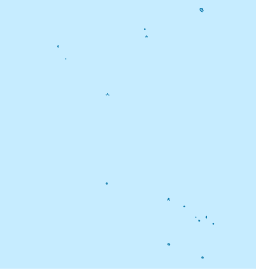Muri Lagoon
| Muri Lagoon | |
|---|---|
 Muri Lagoon from Muri Beach | |
| Location | Rarotonga |
| Coordinates | 21°15′30″S 159°43′45″W / 21.25833°S 159.72917°W |
The Muri Lagoon is a lagoon in the district of Ngatangiia on the eastern coast of Rarotonga in the Cook Islands. The lagoon is a significant tourist attraction and the largest tourism revenue earner in the Cook Islands,[1] accounting for 25% of tourism bed usage on Rarotonga.[2] In 2015 the Cook Islands government declared the environmental condition of the lagoon a national disaster.[1]
Geography
[edit]The lagoon is approximately 1 kilometre (0.62 mi) wide has a maximum depth of 1.25 metres (4.1 ft).[3]: 5 It is bounded on the north by Ngatangiia harbour, and the south by the motu of Taakoka. It contains three small islets or motu. From north to south, the islets are:[3]
- Motutapu, 10.5 hectares (0.041 sq mi)
- Oneroa, 8.1 hectares (0.031 sq mi)
- Koromiri, 2.9 hectares (0.011 sq mi)
The islet of Taakoka (1.3 hectares (0.0050 sq mi)) forms the southern boundary of lagoon.
The Avana and Turangi streams both flow into the lagoon.[3]: 19 Water circulation is driven by waves breaking across the reef, with outflow through the Ngatangiia Harbour.[4]
Pollution
[edit]The lagoon is heavily polluted, with nitrogen from agricultural runoff and leaking septic tanks leading to the growth of noxious seaweed and decreased water visibility.[5] In 2015 the Cook Islands government declared the environmental condition of the lagoon a national disaster.[1] In 2016 the Cook Islands Chamber of Commerce began a program to scrape algae from the bottom of the lagoon.[6] In 2019 the government proposed a centrally-operated wastewater system to reduce the supply of nutrients.[7]
In December 2020 the lagoon suffered an anoxic event, and local residents were warned to avoid swimming or harvesting seafood from the area.[8]
References
[edit]- ^ a b c "Cooks Govt says Muri lagoon at crisis level". RNZ. 27 November 2015. Retrieved 27 July 2021.
- ^ "Interdisciplinary Assessment of the Muri Lagoon: Final Report" (PDF). AECOM International Development Europe. 2018. p. 2. Retrieved 27 July 2021.
- ^ a b c Collins, William T (1993). "SOPAC Technical Report 181: Bathymetry and sediments of Ngatangiia Harbour and Muri Lagoon, Rarotonga, Cook Islands" (PDF). South Pacific Applied Geoscience Commission. Retrieved 10 July 2021.
- ^ Brendan Holden (1992). "SOPAC Technical Report 142: Circulation and Flushing: Ngatangiia Harbour and Muri Lagoon Rarotonga, Cook Islands" (PDF). South Pacific Applied Geoscience Commission. p. 5. Retrieved 27 July 2021.
- ^ "'The golden egg is cracked' – Rarotonga tourism industry threatened by lagoon sewage-seep". TVNZ. 30 December 2015. Retrieved 27 July 2021.
- ^ "Plan to scrape algae off Cooks' Muri Lagoon". RNZ. 10 February 2016. Retrieved 27 July 2021.
- ^ Anneka Brown (6 September 2019). "Muri sewage report drives pursuit of clean treatment". Cook Islands News. Retrieved 27 July 2021.
- ^ Emmanuel Samoglou (31 December 2020). "Residents advised to avoid swimming in Muri lagoon". Cook Islands News. Retrieved 27 July 2021.

